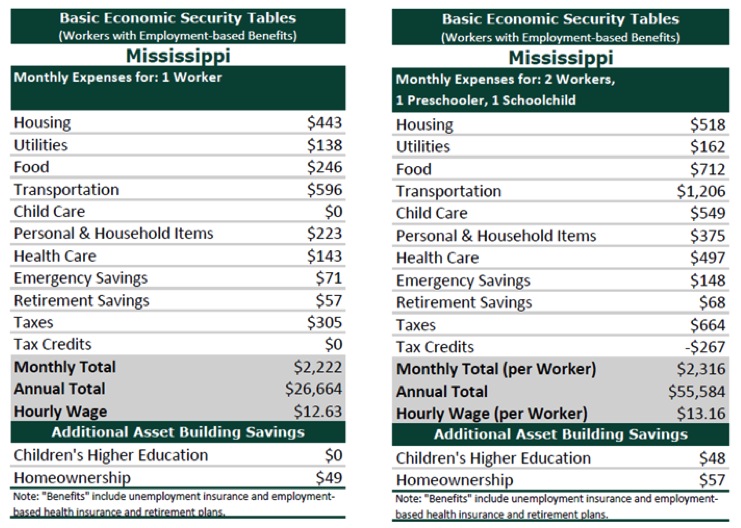INTRODUCING THE BASIC ECONOMIC SECURITY TABLES FOR MISSISSIPPI, 2011
October 18th, 2011
In the wake of the 2007 recession, many Mississippi families are still struggling to reach financial stability in their households. A new report –Basic Economic Security Tables for Mississippi– from MEPC and Wider Opportunities for Women redefines how much Mississippi’s families need for true economic security in today’s economy by covering their basic needs but also saving for life-long economic security.
Basic Economic Security Tables for Mississippi determines how much families need for daily necessities and includes monthly savings targets for emergencies and retirement. These savings targets insulate families from poverty and increase economic security across generations. In Mississippi, a family with 2 workers, a preschooler and a school child needs each adult to work full time and earn $13.16 per hour to reach basic economic security.
____________________________________________________________________
BASIC ECONOMIC SECURITY LINE BY LINE FOR 2 MISSISSIPPI FAMILY TYPES
The tables show monthly basic expenses and savings targets for 2 family types. The table on the left shows average monthly targets for 1 worker in Mississippi. The worker needs $443 for housing, $138 for utilities and $246 for food and so on. In total, a single working adult in Mississippi needs $26,664 per year or $12.63 per month to cover basics and have modest savings for emergencies and retirement.
The table on the right shows similar expenses and savings for family with 2 working adults, 1 preschooler and 1 schoolchild. For this family to reach basic economic security, each adult needs to earn $13.16 per hour for a combined income of $4,632 per month to cover their basic needs and save for retirement and emergencies like job loss or an unexpected medical bill.
The tables assume workers receive employment-based benefits like health insurance through their employer and unemployment insurance. Without these additional employment-based benefits families will need to save more for emergencies and increase their monthly healthcare budget substantially. For example, the average 2-adult, 2-child family which cannot participate in an employer-sponsored health insurance plan pays $634 more per month -$7,608 per year- more than those who do participate in employer health plans.
Want to know more? Keep reading, tomorrow’s post will drill down and look at basic economic security in different counties and we’ll walk through updated online resources for members of communities across the state.
Author: Sarah Welker, Policy Analyst





